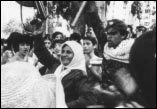パレスチナ革命からわれわれが学んだもの |
|
 |
スタッフ:大倉圭一、大森正孝、城川桂子、豊田直己、 Staff : Okura Keiichi, Omori Masataka, Shirokawa Keiko, Toyoda Naomi,
Osada Yuichi, Nunokawa Tetsuro, Hirano Kenji, Mitsui Mineo |
| 1967年には学生運動を、1970年には闘う労働者を撮り、その後N.D.U.(日本ドキュメンタリストユニオン)を結成して沖縄に向かった、放浪のボーダレス・ドキュメンタリスト布川徹郎。韓国、台湾、アメリカを経てついにパレスチナへと辿り着いた。映像は1976年のイスラエル占領地区ガザの難民キャンプから始まり、瓦礫と化した西ベイルート市街をパレスチナの人民、戦士(フェダイン)たちへのインタビューをはさみながら一切ナレーションなしで各地の映像がただ提示され続ける。爆撃で親を失った子供達は孤児院で戦士になる教育を受けている。そして子供達も戦士(フェダイン)にあるいは英雄になるのが望みであると語る。「お金はいらない、遊びもいらない、ぼくは大きくなったら銃を持ち革命軍にはいるんだ」と少年少女は歌う。取材をはじめて2年後に成長した少女たちの意志も変わってはいない。布川らスタッフは1983年まで取材を続けPLO(パレスチナ解放機構)のアラファト議長へのインタビューも試みた。まだパレスチナの状況が伝わりにくかった時代の貴重な取材である。 | Nunokawa Tetsuro is a roaming, " borderless " documentarian. He filmed the student movement in 1967 and fighting workers in 1970, went on to create the Nihon Documentarist Union (N.D.U.) and then travelled to Okinawa. After having worked in Korea, Taiwan and the United States, Nunokawa ended up in Palestine. Starting with a scene of a refugee camp in Israeli-occupied Gaza in 1976, the film features shots of various districts, dispensing with narration and interspersing inter-views with Palestinian people and fedayeen (guerrillas) in the rubble of Western Beirut. Children who lost their parents in bombings are educated to be soldiers at their orphanage. They say that they want to be soldiers or heroes. Boys and girls sing: " We don't want money. We don't want to play. We will carry guns and enter the Revolutionary Army. " Two years after the filming began, the girls have grown but they have not changed their minds. Nunokawa and his crew members continued filming until 1983, attempting also to interview Arafat, chair of the PLO (Palestine Liberation Organization). These were invaluable interviews in a time when it was difficult to communicate the conditions in Palestine. |